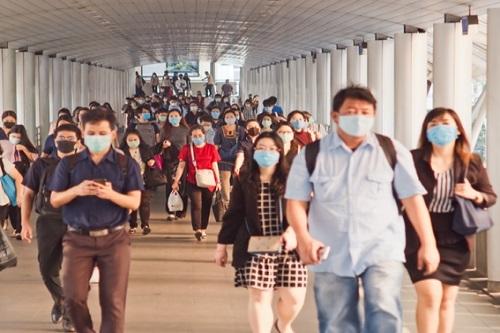How will the events industry change post-Coronavirus?

Authored by MS Amlin
2020 is the year when a huge amount is happening, but no physical events are taking place. The events industry is seeing a wipeout globally, as conferences, music festivals and similar gatherings are being cancelled or moved online under the shadow of Covid-19.
Will the industry spring back to its usual form after the crisis passes, or does this mark a permanent change in how events are planned and executed? What are the key trends to look out for post-Coronavirus?
The impact of Coronavirus on events and conferencing
The events industry is about bringing people together. Sharing information is one thing, but the buzz and bustle of conferences and events have their own appeal, from catching up with your network to chance encounters that lead to new partnerships and bonds.
All that is under threat due to Covid-19 related restrictions. International travel is challenging and potentially risky. Advice on social distancing is subject to change and no one is sure when the rules will be relaxed enough to permit major events to take place once again. In the meantime, many businesses will be making staff redundant and smaller events firms will be struggling to survive.
According to a recent Eventsforce research study, 72% of this year’s events have been cancelled or postponed. Almost half of event planners have postponed events (36% until autumn, 11% opting for winter, 25% delaying until 2021 and 23% postponing indefinitely). Almost one third (27% have cancelled events and a quarter (25%) are seeking to move events online.
Fears for the future of the industry
Uncertainty over the future is making it harder for the industry to get through this challenging period. There may be further virus peaks as people emerge from lockdown, and there is no guarantee that a vaccine will emerge to enable normal social interaction to resume any time soon.
The extension of the furlough scheme until October has brought some assistance to employers who would otherwise be considering making cutbacks. A survey of the Hotel Booking Agents Association’s members found that almost half planned to make at least 50% of staff redundant at the end of June if the scheme was not extended.
Lex Butler, chair of the HBAA said, “The extension of the job retention scheme to the end of October, without change until the end of July, will save thousands of jobs in the events, hospitality and travel industry as many staff would have been made redundant at the end of June. The industry would have been decimated.”
According to the Eventsforce research study, major challenges for events planners include the fluidity of the current situation (66% said this was a concern), changing contract terms with suppliers, sponsors and exhibitors (34%),refunds and cash flow (28%) and managing comms and expectations (25%). Almost 30% were planning to make job cuts and finding ways to cope with long-term financial loss.
What can event planners do to survive the pandemic?
There is no doubt that Coronavirus is bringing pain in terms of human suffering and economic loss. To stand the best chance of coming through the crisis, events planners need to understand what the industry is likely to look like post-pandemic, so they can spot opportunities for stabilisation and growth.
Planners need to go back to basics, reviewing their demographic base and what their audience wants in an event. Conferences and other events that involve international travel or that target more vulnerable demographics such as those advanced in years will need to rethink. High-profile figures and keynote speakers will be less likely to accept bookings and many companies will be banning or limiting employee travel.
The use of technology to deliver conferences during the Coronavirus will probably have a lasting impact - the growth in home working and video conferencing will convert many companies to the advantages of opting for online formats, as well as forcing them to overcome the boundaries to doing so, such as investment in equipment and infrastructure.
Contingency planning and contractual terms are also set to become a hot topic in the industry. Smallprint determines who carries the costs if another peak in cases means we re-enter lockdown conditions, and many insurance policies are now excluding COVID-19-related risk from cover. Companies will need to be very clear-sighted about risk and always have back-up plans if something goes wrong.
The way we behave at events is also set to change. The typical event will no longer see people greet each other with a handshake or kiss on the cheek and lean in for a chat over a plate of food from a shared buffet, in a crowded room. We may see risk limitation measures such as checking delegate temperatures and requiring regular hand sanitation, as well as allowing more physical space per person.
About MS Amlin
MS Amlin is a leading global specialty commercial insurer and reinsurer with operations in the Lloyd’s, UK, Continental European and Bermudian markets.
Comprising Mitsui Sumitomo’s London and Bermuda-based operations and the historic Amlin businesses, MS Amlin specialises in providing insurance cover for a wide range of risks to commercial enterprises and reinsurance protection to other insurers around the world.
It is wholly owned and fully supported by the financial strength and scale of MS&AD of Japan, the eighth largest non-life insurer in the world. To learn more, visit www.msamlin.com.

